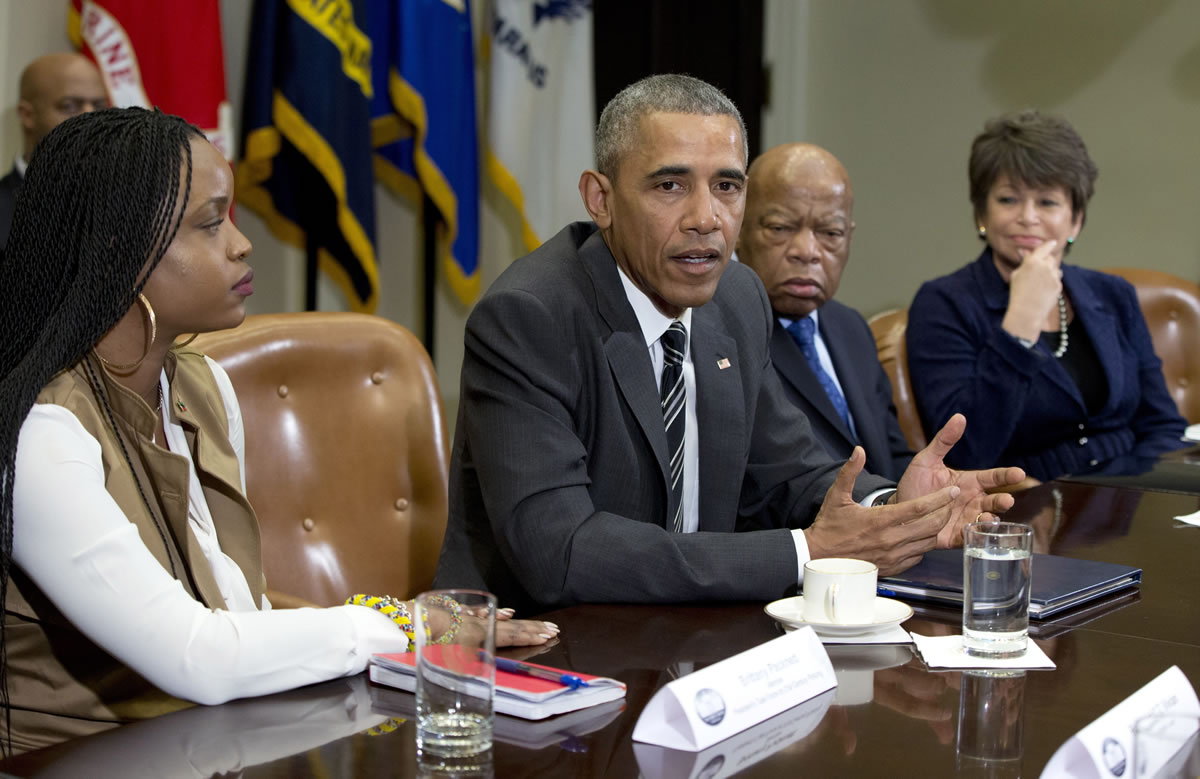WASHINGTON — President Barack Obama’s impending standoff with Republicans over filling a Supreme Court vacancy in the final months of his term is matter of civil rights and respect for the first African-American president, black leaders said Thursday, as they ratcheted up pressure on the Senate to consider a nominee.
At a White House meeting on criminal justice issues, leaders from civil rights groups told Obama they would work together to support him and marshal the public backing he’ll need to force a nominee through the Republican-led Senate. The pledge of solidarity was just the latest sign of outside groups on both sides of the fight gearing up to mobilize ahead of what is likely to be a long and drawn-out election-year battle over his still unnamed choice.
“We see it as a civil rights violation for them to in any way impair the Constitution of this country and to act as if the president is anything less than the president of the United States until January 20, 2017,” the Rev. Al Sharpton told reporters after the private meeting. “He cannot be minimalized, marginalized or disregarded without doing the same to the American people.”
Sharpton’s sentiment captured long-held suspicions among many blacks that Obama has faced greater political opposition and public disrespect because of his race. Sharpton said Obama should not be “profiled any different than any other president in American history.”
He said the groups, which included his National Action Network, the NAACP and the National Urban League, told the president they “collectively would resist” a Senate attempt to prevent Obama from filling the seat left open by the death of conservative Justice Antonin Scalia.
Senate Majority Leader Mitch McConnell has said he believes the next president should pick Scalia’s successor. McConnell argues the electorate should have a say in who holds the lifetime appointment, which could shift the ideological tilt of the court for a generation. Other Republicans have suggested they are open to holding hearings and voting, as is typical, while they are unlikely to back Obama’s nominee.
The possibility of Republicans blocking hearing on a nominee has riled the Democratic base and ensured that whomever Obama chooses will become an election-year cause celebre. That added political calculation has led some to argue Obama should nominate an African-American, mindful that it could help drive up support from black voters crucial to Democrats’ chances of holding the White House.
The White House has said Obama values diversity on the bench, but has not indicated specifically whether he’s considering a black nominee.
Leaders in the meeting Thursday said they did not press Obama on specific names.
Attorney Benjamin Crump said he did not suggest a name, but noted that Attorney General Loretta Lynch — who has been discussed as a possible candidate — was present at the meeting and was commended by the attendees for her efforts to try to improve policing in black communities.
Crump, the president of the National Bar Association, said he also told Obama that his organization represents more than 66,000 black lawyers and that part of the group’s mission is to “ensure that we have jurists who reflect all Americans and their issues and concerns,” he said.
Marc Morial, president of the National Urban League, added that “now is a good time” for Obama to name a nominee, and said a black woman would be an appropriate choice because there has never been one who served on the high court. Morial said the Urban League made the same suggestion before Obama nominated justices Sonia Sotomayor and Elena Kagan.
When asked about whether Lynch would make a good choice, Morial said: “I think she’s got a great job right now. She’s committed to that job, but Attorney General Lynch could do any job in the law. I won’t go further than that.”
Obama also praised Lynch, saying she has been very focused on identifying problems “in the equal application of the law,” and also on “how the Justice Department and the FBI can be models for how we approach some of these issues.”
The meeting took place ahead of a reception celebrating Black History Month. The White House billed the event as the first of its kind because those invited represent different generations of civil rights leaders. The White House’s attempt to engage part of the younger generation of activists did not go as planned.
A representative of Black Lives Matter Chicago declined an invitation. In an article on Truthout.org, Aislinn Pulley wrote she would not participate in what she called “basically a photo opportunity” for the president.
——
Associated Press writers Errin Haines Whack and Kevin Freking contributed to this report.




